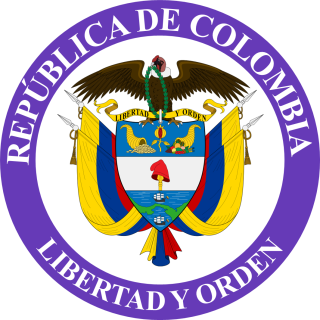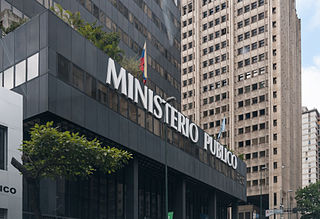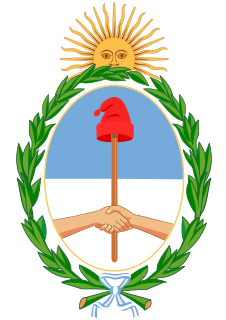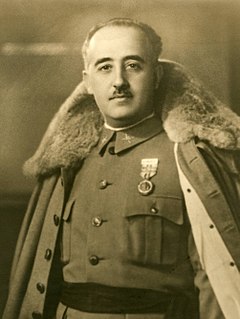Related Research Articles

The politics of Panama take place in a framework of a presidential representative democratic republic with multi-party system, whereby the President of Panama is both head of state and head of government.
The Panamanian Public Forces are the national security forces of Panama. Panama is the second country in Latin America to permanently abolish standing armies, with Panama retaining a small paramilitary security force. This came as a result of a U.S. invasion that overthrew a military dictatorship which ruled Panama from 1968 to 1989. The final military dictator, Manuel Noriega, had been belligerent toward the U.S. culminating in the killing of a U.S. Marine lieutenant and U.S. invasion ordered by U.S. President George H. W. Bush.

The Supreme Tribunal of Justice is the highest court of law in the Bolivarian Republic of Venezuela and is the head of the judicial branch. As the independence of the Venezuelan judiciary under the regime of Nicolas Maduro is questioned, there have recently been many disputes to whether this court is legitimate.

The Administrative Department of Security was the security service agency of Colombia, which was also responsible for border and immigration services. It was dissolved on 31 October 2011 as part of a wider Executive Reform, and was replaced by the Dirección Nacional de Inteligencia (DNI).

The Cabinet of Ministers of Venezuela (Spanish: Gabinete de Ministros de Venezuela is one of the bodies that make up the Venezuelan executive in that country's presidential system, alongside the Council of Ministers. The Cabinet is headed by the President of Venezuela, and his corresponding Vice President. The purpose of the ministries is to create, adopt, follow and evaluate policies, strategies, programs and projects in accordance with the constitution and the laws of the Republic.

Nicaragua is a country in Central America with constitutional democracy with executive, legislative, judicial, and electoral branches of government. The President of Nicaragua is both head of state and head of government. Executive power is exercised by the government.

According to the Organic Law of Regional Governments, the regions are, with the departments, the first-level administrative subdivisions of Peru. Since its 1821 independence, Peru had been divided into departments but faced the problem of increasing centralization of political and economic power in its capital, Lima.
The Ministry of the Interior and Justice, was at national executive ministry of the Government of Colombia responsible for the enforcement of both law and administration of justice, equivalent to the justice and interior ministries of other countries.

The National Archives of Chile is a public organization of the Chilean state, created in 1927 with the goal to "collect and conserve the archives of the Departments of State and all the documents and manucsrpits related to the national history, and to oversee their organization and use.". It is treated as a dependent organization of the Dirección de Bibliotecas, Archivos y Museos, which is administered by the Consejo Nacional de la Cultura y las Artes de Chile.

The Ministry of the Interior (MIR) is a department of the Government of Spain responsible for public security, the protection of the constitutional rights, the command of the law enforcement agencies, national security, immigration affairs, prisons, civil defense and road traffic safety. Through the Undersecretariat of the Interior and its superior body, the Directorate-General for Internal Policy, the Ministry is responsible for all actions related to ensuring political pluralism and the proper functioning of electoral processes.

The Ministry of Justice and Law, is the national executive ministry of the Government of Colombia responsible for the administration of law and justice, equivalent to the justice ministries of other countries.
The Ministry of the Popular Power for Interior, Justice and Peace is one of 39 agencies that make up the executive office of the Venezuelan government. This ministry is also called the Ministry of Popular Power for Interior Relations and Justice and Ministry of Interior and Justice.

The Public Ministry of Venezuela is an organ belonging to Citizen Power, it has autonomous and independent character. It is under the direction of the Attorney General of the Republic who is elected by the National Assembly for a period of seven years.

The Ministries of the Argentine Republic, which form the cabinet, currently consist of sixteen ministries under a ministerial chief of staff. The ministers are appointed by and serve at the pleasure of the president. The current organization derives from the constitutional revision of 1994, and is governed by "The Law on Ministries".

The Ministry of the Interior of Argentina is a ministry of the national executive power that manages issues pertaining to domestic politics such as immigration and co-ordination between the federal government and the governments of the provinces of Argentina.

The Ministry of Public Works of Argentina is a ministry of the national executive power that oversees and advises on the elaboration and maintenance of roadways, urban and hydraulic infrastructure and other types of public works.

The Ministry of Culture of Argentina is a ministry of the national executive power that oversees the government's public policy on the culture of Argentina.
The Ministry of Justice and Human Rights of Angola is judiciary arm of government that specializes on human rights in the nation of Angola.

The Ministry of Agriculture, Livestock and Fisheries of Argentina, commonly known simply as the Ministry of Agriculture, is a ministry of the national executive power that oversees production, commerce and health regulations in the agricultural, livestock and fishing industries.

The first government of Francisco Franco was formed on 31 January 1938 during the Spanish Civil War, shortly after having been proclaimed as Head of State of Spain. It succeeded the Technical State Junta in the Nationalist zone—eventually, it would also take over from the Republican National Defence Council at the end of the war—and was the Government of Spain from 31 January 1938 to 9 August 1939, a total of 555 days, or 1 year, 6 months and 9 days.
References
- ↑ "Objetivos del Ministerio de Gobierno". Ministerio de Gobierno (in Spanish). 2016-01-31. Retrieved 2018-07-18.
- ↑ "A Guide to Panama's Legal System and Research - GlobaLex". www.nyulawglobal.org. Retrieved 2018-07-18.
- ↑ "Galería de ex ministros para rescatar la historia". Ministerio de Gobierno (in Spanish). 2016-11-24. Retrieved 2018-07-18.
- ↑ "Panama". U.S. Department of State. Retrieved 2018-07-18.
- ↑ "Senate Executive Report 104-3 - TREATY WITH PANAMA ON MUTUAL ASSISTANCE IN CRIMINAL MATTERS". www.gpo.gov. Retrieved 2018-07-18.
- ↑ "Ley 15 del 14 de abril de 2010". Act No. 15 of 2010 (PDF). Asamblea Nacional de Panamá.
- ↑ "Ley 19 del 3 de mayo de 2010". Act No. 19 of 2010 (PDF). Asamblea Nacional de Panamá.
- ↑ "Historia del Ministerio de Gobierno". Ministerio de Gobierno (in Spanish). 2016-01-31. Retrieved 2018-07-18.